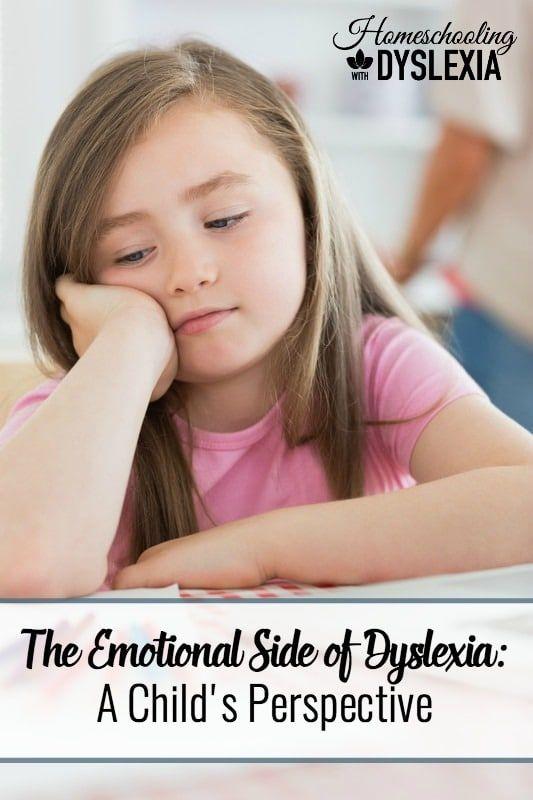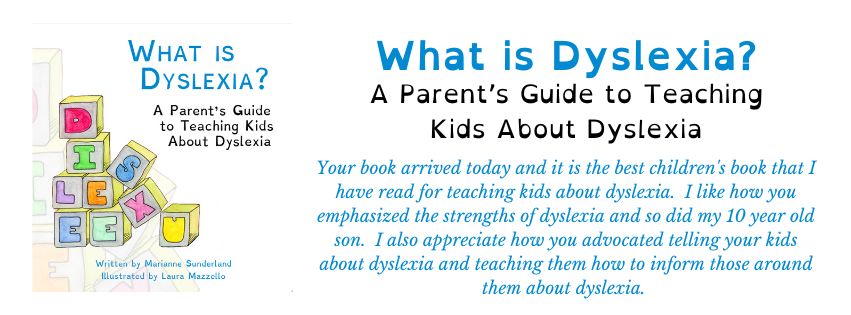The day-to-day difficulties of being dyslexic can cause certain emotional issues
for families who have kids with dyslexia.

I write a lot about how smart and talented people with dyslexia are. I am passionate about dispelling the myths about dyslexia so that the people who have it can shake off the myth that they just aren’t smart and really learn in the way in which they were created to learn.
Dyslexia can affect other areas aside from the language arts, areas such as memory, organization, attention, communication, social skills, and focus.
The reality is that many dyslexics who are struggling in these areas day after day can get discouraged. Learning these language-based and organizational tasks are HARD for the dyslexic thinker. Growing into your own skin and understanding your dyslexia can take time, time that is often full of trial and error and plenty of ups and downs.
Common Areas of Struggle for the Person With Dyslexia
Not all dyslexics suffer from discouragement, however, most families will experience at least a few of these common issues.
Loss of confidence in learning. Kids with dyslexia learn differently and on a different timeline than their peers who learn well with traditional methods. Some kids respond to this awareness with embarrassment or shame.
Difficulty in social situations. Kids with dyslexia can be emotionally and socially immature which can effect the quality of their relationships which can cause lack of confidence over time.
Processing lags can cause some dyslexic kids to have trouble finding the right words or keep up with conversation in a group. This is especially true as a child reaches the teen years.
These issues can lead to increased anxiety and fear of failure and embarrassment. Anxiety leads to avoidance of the situations that are awkward, which can lead to more criticism from unknowing parents and teachers.
All of these frustrations can lead to anger which can look like rebelliousness. Understanding the root of these problems is so important for parents of dyslexics. No one knows your child like you do!
Many dyslexic kids who are attending public schools are waiting for the schools to help them learn, while they are falling further and further behind. This daily comparison to kids who are able to learn well with traditional methods can quickly erode confidence.

Some kids with dyslexia are able to brush off their struggles and press on cheerfully while others can experience:
A loss of confidence: A child’s early years are spent developing their self-image. If these years are full of frustrations from school, they will lead to feelings of inferiority. If not helped quickly this can lead to feeling powerless and incompetent.
Research also suggests that these feelings of inferiority develop by the age of ten. After this age, it becomes extremely difficult to help children develop a positive self-image. This is a powerful argument for early intervention and homeschooling.
Depression: This same series of frustrations can lead certain children to depression. The signs of depression in children can be different than those in adults.
Signs of depression in children:
- Child has negative thoughts about themselves
- Child tends to view the world negatively
- Child lacks hope or an ability to imagine positive things in the future
Family Problems
Interestingly, sibling rivalry is common in homes where one or more children are dyslexic. The kids without dyslexia can feel jealous of all of the attention, time and money being spent on the dyslexic child. This kind of negative attention, of course, is unwanted by the child with dyslexia and can cause more stress.
Parents themselves may misunderstand dyslexia and insist that the child just work harder, which doesn’t work.
If the parent was dyslexic, watching their child go through the same struggles that caused them so much pain may stir up bad memories in them.
Loss of interest or zeal for learning
If a child is consistently performing below expectations and no matter how hard they try, they are still falling short, it is easy to understand that they may lose interest in learning.
Low tolerance or patience with difficulty
Without regular success, kids with dyslexia can develop a low tolerance to difficulty, causing them to give up quickly when a project is perceived as being too hard.
I write this post to help parents and teachers understand some of the emotional struggles our kids can have growing up dyslexic.
The conversation doesn’t stop here. Read this post to learn Tips For Overcoming Emotional Issues Caused by Dyslexia.







I read this post almost in tears, I learned today that my son who is eight years old may have dyslexia and is suffering the same problems I had as a child. As a child I was diagnosed with dyslexia, and from fourth grade on was put into special-education classes with children that have down syndrome and other major disabilities. From fourth grade to the day I dropped out of school in 10th grade I suffered discrimination, depression and was made fun of to the point that other kids that were my friends and in normal classes were made fun of and got in fights just because they were friends with me. I thought that thinking of suicide was a normal adolescent thinking . And today after getting my college degree still suffer working job to job not able to hold a career at 38 years old .
I am so sorry to hear of your struggles. I just cannot fathom how teachers and schools can allow that sort of thing. So sad. The good news is that you found out early that your son has dyslexia and you can help him. If you need any resources or to talk privately, email me at mariannesunderland at yahoo dot com.
Our dyslexia journey has been very interesting, especially in uncovering the emotional difficulties it caused. All four of our children are dyslexic, and so is my husband. We have always homeschooled our kids yet they still have school anxiety. I have a lot of guilt for how I treated our first two, to be honest. I realized when they were in 3rd and 1st grades that stubbornness was NOT the issue and changed how I approached school completely. As I learned more about dyslexia and shared with my husband the issues that can arise because of a light went on. All of his report cards said, “hard worker, but doesn’t apply himself”. His parents were often disappointed in him because test scores did not line up with what they believed he was capable of. I am so thankful that we home school and that God put certain books in my path. I would say that the emotional issues have been as difficult to deal with as the actual learning difference my children face.
That is a good point Kara. Our older kids definitely suffered from my lack of knowledge. It is so important for kids and parents to understand dyslexia so that they can understand better what to expect as well as to understand that they are smart but learn differently. Still, the difficulties that our kids face as homeschoolers are far less than what they would experience in school. So thankful you found the site and thanks for sharing!
Hi Marianne
I really like how you spell out some of the the symptoms of depression in children. Although the stigma around mental illness is less than it was I get really frustrated that often the diseases are mentioned or promoted but not the symptoms! So how are you supposed to know if you or someone you love has a mental illness?
I have ADD, dyslexia and depression. Only found out I was diagnosed with dyslexia when I was ten about a month ago (I’m thirty). Learning more about ADD and dyslexia and how they make certain things difficult has really boosted my self-esteem. It’s also helped me put some of my issues about my childhood into perspective and has helped me understand my parents better.
If I were to give any advice to a parent of a child with a learning disorder it would be to not just focus on school results but on other things as well, like self regulation and organization. And if you don’t understand why a doctor recommends something ask them why until you understand (that’s part of a doctor’s job).
Thanks for a great post
My daughter is profoundly dyslexic. The processing lags! Oh, the lags! She was just telling me two days ago about this being her fear of speaking to people, therefore she comes off as shy or socially anxious, but it’s really her fear of not understanding someone. Then top that with the fact that she’s bipolar (emotion x 10,000) and it can be a very difficult thing for her.
My 9 year old son is dyslexic and has yet to find a teacher who understands him. He’s constantly told to try harder and concentrate. He is a very caring child with a huge heart., but he is showing signs of depression and gets angry and frustrated. I will never give up on him or his education but feel the school system has let him down.
Have you considered homeschooling?
Hi Tracy, A huge part of the battle is finding a teacher that can connect, but…then they need to be teaching O.G., or under that umbrella. Have you contacted the Children’s Dyslexia Center in your State? They are through the Masons/Shriner’s. It is free if your child has a diagnosis.
Marianne, I have always considered your articles. I will share that finding out I am an undiagnosed Dyslexic who birthed a boy with all the challenges of decoding in literacy, math and organization to be a challenge for me. I was guilted daily sending my son to school, know that educational harm was occurring and he was exhausted, angry and depressed. I know that as a single mom who wanted more than anything to give him the tools….that I was not able to do the homeschooling that he would need. Guilt and anger was something we shared. I know many moms through our nonprofit (which is in every state, and Canada), Decoding Dyslexia have said their family dynamic and happiness has totally changed when they homeschooled. I give you all a standing O! I wish I had reached out on the social network to connect with moms/dads that were homeschooling for this and maybe pairing up with others might have worked. I found out later that there was a Homeschool the next town over that had 16 children and several were dyslexic in a co-op homeschool. Very cool, and very sad that parents are having to take this burden and expense on. Albeit far less expensive than the personal destruction that the public schools do….and far less expensive than the private schools which generally run at $50K a year for this.
Have been advised against it by another mum who took her son out to homeschooled. She found the lack of support for both herself and her frustrating and demoralizing. She is my sons tutor and if I had the funds he would see her more than once a week.
The lack of unstant recall and stuttering makes me a social flop. At age 51 i am very introverted and have no friends because im always feeling inferior, unable to speak freely ir remember things like names or other details. It makes keeping a job hard too. I have to wrote down EVERY thung or i forget it in a few minutes. Im high IQ and a fast learner, but People say im stuck up and weird cause i avoid speaking or developing friendships cause i dont know how anymore so at work im like the weirdo they avoid. Makes me depressed a lot too, im lonely. Its been a very lonely life.
Marianne,
I am homeschooling three kids! My oldest who is 10 has really been struggling this year, she has struggled a little bit in the past but when I pushed her harder she always seem to persevere ( not without tears though) .. This year I feel like we have gone backwards if anything.. She is emotionally stressed and has school anxiety.. She usually ends up doing her work twice because I feel she can do better., I can see she’s getting burnt out and I’m sure I’m probably partly to blame as I’m coming to realize there is more to this problem than work ethic. Any help resources, advice, curriculum advice, teaching methods, strategies, etc.. I need help!
I know that this traditional memorization method is probably not ideal for her.. What do most people use instead?.
Thanks
Jamie
Did you ever find help? I am dyslexic and my 2 daughters. I also homeschool. I have gotten so much help…let me know if you still need some.
Yes, Mitzi. Thank you!!
how can I citate this site, can you Marianne tell me? because nowhere is written the date when it is published.
I use a citation generator for citing websites!